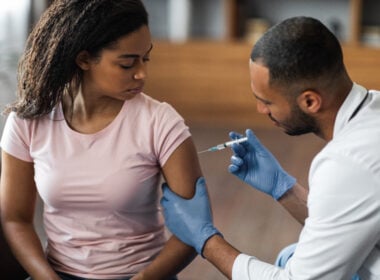As I am writing, women all over the U.S. are being reminded of their risk of heart disease and stroke under the Red Day campaign organized by the American Heart Association. We would like to do our part in this campaign.
The campaign reminds us that 1 in 3 women dies of heart disease and stroke. The Stroke Association reported that more than 100,000 U.S. women under 65 will have a stroke in a given year, underscoring that strokes are not just happening to the stereotypical old, obese woman smoking a cigarette. A campaign article[i] about the hidden risk factors for strokes also says: “Women who take even a low-estrogen birth control pill may be twice as likely to have a stroke than those who don’t and the risk may increase if other risk factors are present.”
Sadly, the number of strokes happening to women under 35 has risen sharply in the past 20 years. A 2012 CDC study[ii] showed that from 1995 to 2008, the number of women ages 15 to 34 hospitalized for a stroke rose some 23 percent, and that hospitalizations for those aged 35 to 44 went up 29 percent. The Washington Post recently reported that “in 2012, a review of hospital records in the Midwest found a 44 percent jump in strokes between 1993 and 2005 among people younger than 55.”
Warnings about birth control for some women
Young women are at higher risk of stroke if they use hormonal birth control. The chance of suffering a stroke increases as you accumulate risk factors; that’s why for instance, smoking and using birth control pills is a very bad idea even for young women. Compared to non-smoking, non-oral contraceptive (OC) users, women who both smoked and used OC had a 7.2 higher risk of a stroke[iii].
Hormonal birth control can also be problematic for women who are overweight or obese, or have a family history of high blood pressure. As we have written in another post, young women in great health and with no other known risk factors at all have died from using hormonal contraceptives such as the Nuvaring® or the Bayer Pharmaceuticals brands Yaz® and Yasmin® birth control pill.
The deafening silence about natural options
While we applaud the American Heart Association for educating women about strokes factor and for providing some caution about hormonal birth control methods, they leave women who are at risk with too few options. What options exist for a woman who would like to prevent a pregnancy, but is not ready to give up her fertility completely, as they propose?
Noticeably absent from AHA’s campaign is mention of fertility awareness methods, even though—due to their lack of side effects— they should arguably be the main go-to method of pregnancy prevention for women who have health concerns. With adequate instruction from an teacher trained in an evidence-based, women can confidently use these methods to avoid pregnancy. With the development of phone apps, learning, and practicing these methods is made easier. With a few clicks and simple daily check-ups, these apps help women track their actual fertile days and plan their love life based on knowledge of their date of ovulation. Fertility awareness methods are not invasive, respect the body, and are not rocket science.
So our call today, a couple days after Red Day, is to share about this amazing option for any woman who you know may be at risk and is using hormonal birth control. Share this article with #GoRedshouldGoGreen. You may save a woman’s life.
This article was last updated on April 6th, 2023 to include links to updated statistics on pregnancy prevention effectiveness rates for evidence-based fertility awareness methods (FAM).
References
[i] http://www.strokeassociation.org/STROKEORG/AboutStroke/UnderstandingRisk/Hidden-Risk-Factors-for-Women_UCM_310403_Article.jsp
[ii] Reported by ABC News in 2012: http://abcnews.go.com/Health/Wellness/young-women-strokes/story?id=15835224
[iii] Stroke in Women, Elsevier file:///C:/Users/Gerard/Downloads/02bfe5138ccf31611b000000.pdf
Stroke in women, Sylvia Wassertheil-Smoller*, 18 February 2010











